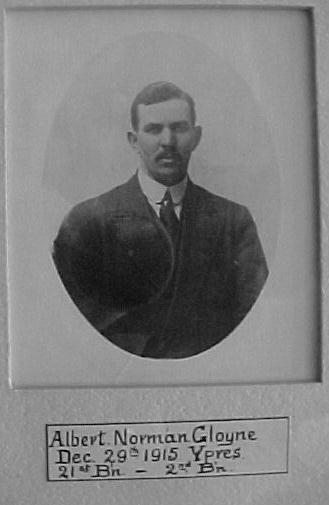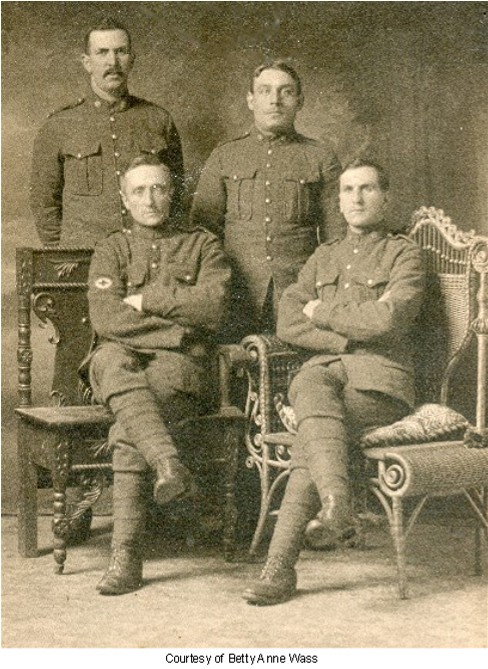|
Albert Norman Gloyne, born at Castel Farm, Stowford, Devon, 20 September 1888, was a
resident of Port Hope for several years, employed by the Standard Ideal Company Limited.
He enlisted at
Kingston with the original 21st Battalion, which later became one of the most famous
fighting units of the Canadian Corps in France. Gloyne was attached to the headquarters
staff and was on military police duty at the time of his death. He was on service in the
village of - - - - which was being shelled by the enemy, directing troops as to the best
course to take to avoid danger, when a shell burst near him and he was mortally wounded.
He was carried to the casualty clearing station where he died some hours later.
He was a good
soldier and a good citizen, and won the sad distinction of being the very first citizen
soldier from Port Hope to give his life in the Great War. His body lies in Bailleul
Communal Cemetery, France.
|
|
Photo and
text above reproduced with permission
Taken from the "Book of Remembrance (A
record of the men of Port Hope who participated in the Great War of 1914-1918)" by
James A. Elliott, Chairman of Committee, Port Hope, Jan. 1st, 1919.
|
|
|
Sep 21, 1888
|
Born in Stowford, Devon, England to William and
Mary (nee Littlejohns) Gloyne
|
|
Jan 19, 1910
|
Embarked the SS Corinthian in London with his
brother Charles
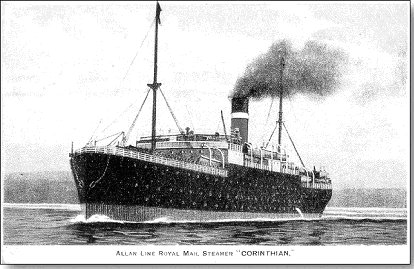
|
|
Feb 1, 1910
|
Albert and Charles disembarked in Saint John,
New Brunswick and proceeded to Colborne, Ontario. Albert
claimed to have been in Canada previously in 1905
|
|
Mar 16, 1910
|
Married to Mary Jane Connors in Port Hope,
Ontario. He gave his residence as Colborne,
Ontario
|
|
Nov 11, 1914
|
Attested into the 21st Battalion in
Kingston, Ontario
Ø Number 59371 (temporary number 70)
Ø Next of kin given as Jane Gloyne, wife, Port Hope, Ontario
Ø Previous occupation given as Labourer
Ø No previous military experience given
Ø Religion given as Wesleyan
Ø Assigned to “A” Company
Albert’s brother Charles Gloyne attested into the battalion 3 days
later
The battalion trained in the Kingston area
through the winter with headquarters in the Kingston Armouries
|
|
May 6, 1915
|
Embarked the RMS Metagama in Montreal, Quebec
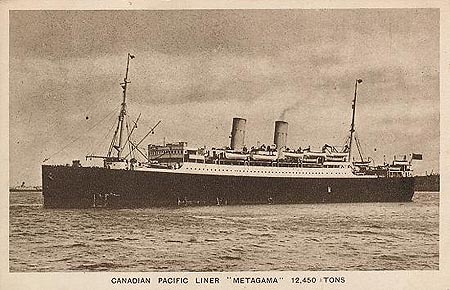
|
|
May 15, 1915
|
Disembarked in Devonport, England and the
battalion proceeded to the West Sandling Camp, near Hythe, Kent to continue training
|
|
Jun 4, 1915
|
Attached to the 2nd Division HQ Sub
Staff at St. Martin’s Plain to be employed as a Military Policeman
|
|
Jun 24, 1915
|
Transferred to the 2nd Division
Headquarters Staff
|
|
Jul 13, 1915
|
Appointed to the rank of Acting Corporal
|
|
Sep 14, 1915
|
The headquarters staff embarked the SS Queen in
Folkestone along with the 19th Battalion
|
|
Sep 15, 1915
|
Disembarked in Boulogne, France and the
headquarters staff and proceeded to St. Omer by motor car.
|
|
Dec 29, 1915
|
While giving directions at the cross roads in La
Clytte, Belgium to troops moving up to the front, an enemy shell exploded close by and
A/Cpl Albert Gloyne received severe shrapnel wounds, not the least of which were 2
fractured legs. He was taken to the No. 5 CFA
(Canadian Field Ambulance) for first aid. 4
men were killed instantly, and 8 others died of their wounds shortly after from this
barrage.
He was transferred the same day to the No. 2 CCS
(Casualty Clearing Station) for treatment where he died there the same day
|
|
Jan 1, 1916
|
A/Cpl Gloyne was
buried in the Bailleul Cemetery Extension. One
of those in attendance was his brother, Private Charles Gloyne

Following the war the
1914-15 Star, British War Medal, Victory Medal, Plaque (Dead Man’s Penny), Scroll and
Memorial Cross were sent to his widow, Mrs. Mary Jane Gloyne, Port Hope, Ontario
A second Memorial
Cross was sent to his mother, Mrs. Mary Gloyne, Tinhay, Sifton, Devonshire, England
|
|
Albert Norman
Gloyne is commemorated on the Port Hope War Memorial
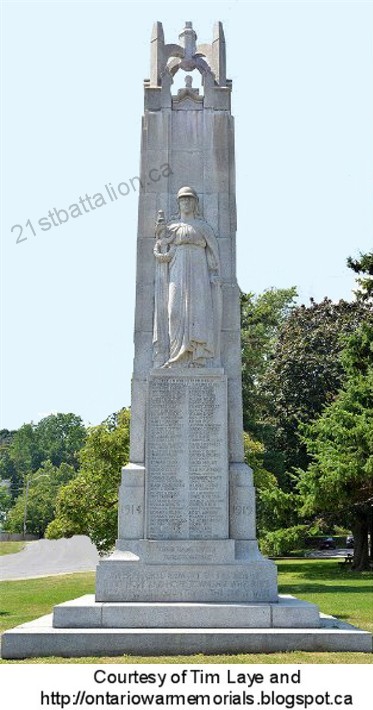

|
|
|
2010
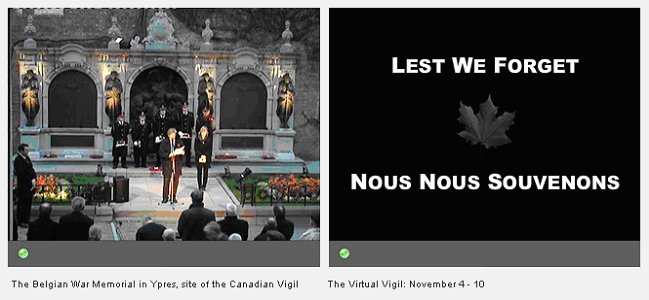
For the 7 nights leading up to November 11, 2010,
the names of all Canadian soldiers were projected onto the Belgian War Memorial in Ypres. At the same time, the same names were being
broadcast via the internet to schools across Belgium and Canada. The image above shows the opening ceremonies at
the Belgian War Memorial on November 4, 2010.
Below on the left is the name of Albert Gloyne being
projected on that wall. Below right shows the
name being broadcast to the schools. Each
name appeared for 25 seconds and each night 9,700 names were shown.
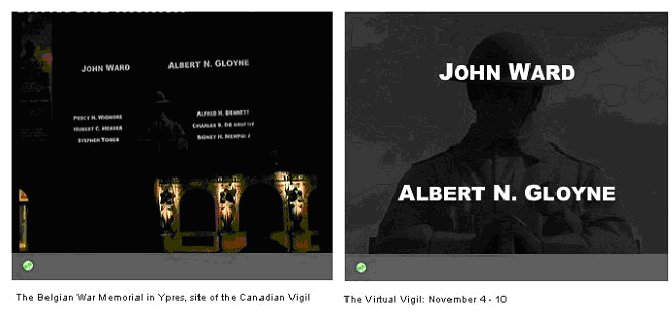
|
